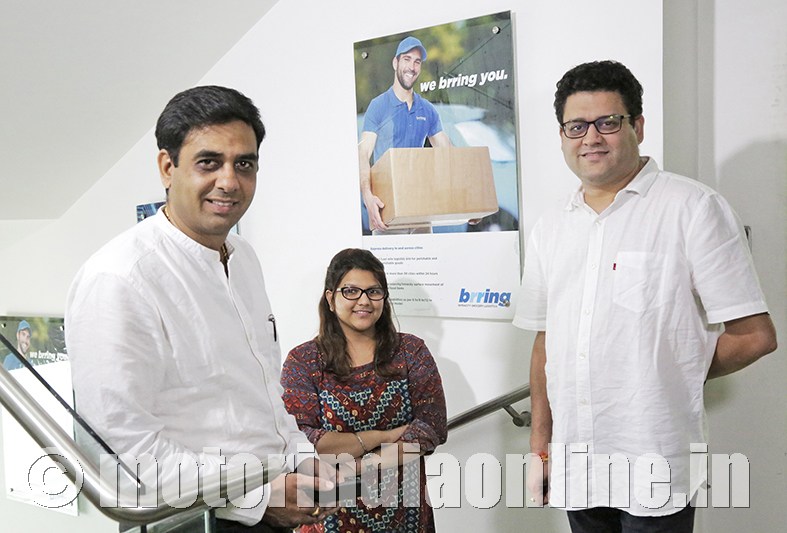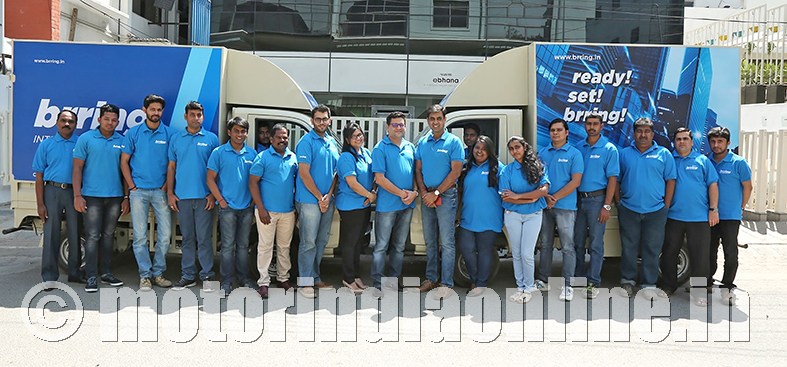I smiled when I read ‘Brring’ written on the side of a one-tonner parked outside an apartment’s gates to unload a delivery. It was really self-explanatory and the movers and shakers of this ‘Intracity Grocery Logistics’ providers confirmed that it was named so because it sounded colloquial enough and also because it was, well, self-explanatory.

An offshoot of Sovika Group – an aviation company – Brring was established in 2014 to offer end-to-end logistics mainly for perishables. It has a built-in advantage – that of taking piggyback rides on its parent company’s fleet and connecting 31 cities across the country in last mile logistics.
Mr. Abhishek Nehru, CEO, Brring, shares: “The idea was to create a niche supply chain for mainly perishables. Brring was formed to be a solutions company and not a product-based one. Today our client base includes Big Basket, Furlenco, Fortis Hospitals, Grofers, Amazon, and McDonald’s. We are helping Big Basket set up their operations, and for Furlenco – even though they are furniture people – their whole supply chain.”
Fortifying cold chain solutions
Brring did business worth Rs. 33 crores last year and have set up a target of Rs. 60 crores in the current year, with an eye on touching Rs. 100 crores within the next couple of years. As the company evolves, the core team is casting their net wide and far and is open to offering tailor-made solutions to different categories of customers. Fortis Hospitals makes for one strong case study.
Mr. Nehru says: “Fortis was spending 40-50 per cent of their cost on food. Each of their hospitals has its own kitchen, manpower, and equipment. Their problem was wastage of food and decentralized buying for their kitchen operations. They wanted centralized kitchen but the challenge was the sensitive matter of food offered to the patients. Since it is a huge quantity of cooked food, transportation was a challenge that too with following their strict safety norms. We agreed upon a trial run where they shut down a kitchen of one hospital. We took our reefer vehicle and we realized that while transporting half the food was spilled and half went bad. Luckily it was not intended for the patients. We learned that the food needed to undergo something called blast chilling wherein cooked food immediately is blast chilled to bring the temperature down to four degrees. We learnt that food in the range of zero to four degrees is called the low danger zone where it does not get contaminated unless there is a physical aspect to it.”
The learning continued in the form of the material that the reefer was made from – aluminium.
He continues: “Aluminium body of the vehicle was a high potential physical contaminant. So Brring opted for using 100 per cent stainless steel 33 grade body for the reefer where even the screws are made of stainless steel. They are also fitted with rodent repellants, cameras and the trolleys are designed in such a way that they can be locked in to avoid spillage.”
According to him, it took them two months to convince Fortis to conduct thorough tests and trials. Combined with the efforts of Fortis’ staff and Brring’s solution, Fortis managed ‘to reduce costs to almost 50 lakhs rupees per month’.
With this success neatly bagged, Brring now wishes to get involved in sourcing and transporting food and vegetables for customers. Stepping up their expansion plans, Brring set up a new vertical in April 2017 to do exactly this.
Mr. Satthya Murrty, VP – Strategy and Business Development, shares: “We transport about five tonnes of fruits and vegetables daily to Fortis. We started with one hospital and now we are in three Fortis hospitals. We are taking this to other hospitals also. We are creating a B-to-B app, so that the vendors can directly order using it where daily rates are shared. We have started with Delhi and our plan is to go to Mumbai.”
Milking opportunities
Unafraid of venturing into avenues that may not have been explored till now, Brring took up the distributorship of a popular milk marketing federation.
Mr. Nehru shares the story: “McDonald’s was facing problems in supplying milk to its McCafe shops besides not being able to source a specific kind of milk and supply it to all their chains in Mumbai. They found that the local milk was often changing the quality of their coffee. They approached us and we helped them by sourcing it according to their specifications. Since the cost of the milk is at least 60 per cent of the cost of the coffee and if we were to add the logistics cost too, the cost goes up even more. That was when we decided to take up the distributorship for Amul. The advantage was that as a distributor, we receive a margin of two rupees per liter. Another point was that we could only supply the milk at night because our vehicles were busy in the day and free at night. So our overheads were taken care of and the cost of the milk including the logistics is maintained.”
It proved a win-win for both. Since the time Brring started supplying to McCafe outlets in Mumbai, the client was able to more-than-double the number of their outlets.
To add on, Brring has now started catering to Amazon’s food business as well, “It took us seven months to break in. Besides food, we have started handling five of their hubs for large appliances – one each in Gurgaon and Chandigarh, we are opening two more in Delhi and one in Bangalore,” says Mr. Nehru.
Mr. Murrty explains: “We want to be the last mile logistics providers in non-perishable items as well. And the demand is high. Clients respond well to us because we are able to fit in with their requirements.”
And tailor-made solutions in logistics is keenly sought-after in an otherwise unorganized supply chain sector in India.
Big on training
And that is where training the handlers comes in handy because it adds quality to Brring’s services. Mr. Nehru adds: “We have a training team here and in Guwahati where we have a training centre too. Brring provides the stewards servicing the hospitals and the drivers transporting the goods with places to stay. We conduct training sessions in Bangalore, Mumbai and Delhi too. The duration of the training is weeklong that include two days in the classroom and rest running the field. But our other customers like Grofers and Big Basket have their own training programs. When we finish our training the students are handed over and they do four days of training. They are taught how to handle the food, especially the meats, and also taught about non-risky behavior. They are told not to enter the house if there is only a lady or a child present at the time of the delivery. Then they also learn how to handle the crates, and soft skills. Those servicing Fortis undergo three-month rigorous training and the students undergo a medical test as well.”
Brring owns 170 vehicles of their own and have 200-250 drivers on the call.
The core team wants Brring to become popular for providing world-class end-to-end logistics mainly in food and in retailing too.
Brring is in!
